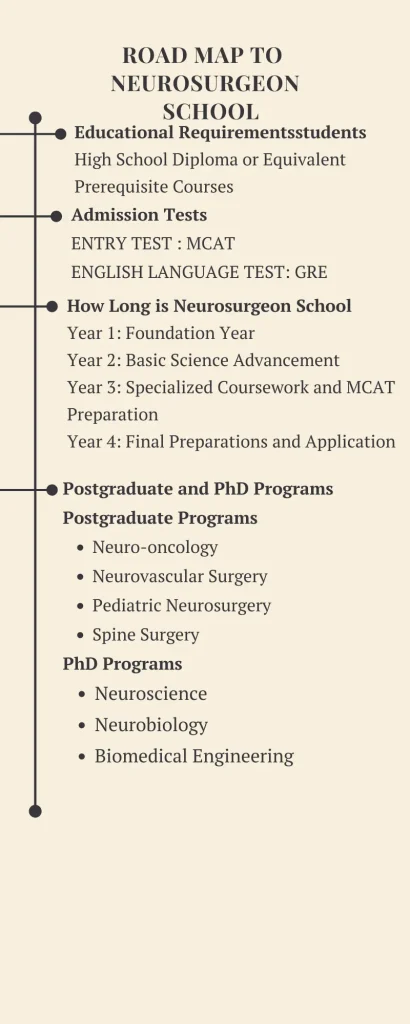How Long Do Neurosurgeons Go to School
Neurosurgeons typically undergo extensive education and training. The journey begins with a 4-year undergraduate degree, followed by 4 years of medical school. After earning an MD, they complete a 6-7 year neurosurgery residency program. In total, the answer to “How Long Do Neurosurgeons Go to School” is about 14-15 years.
What is Neurosurgeons School
Neurosurgeons School refers to the comprehensive educational and training pathway that aspiring neurosurgeons must follow. It starts with an undergraduate degree in a relevant field, focusing on pre-medical courses. Following this, students attend medical school, where they gain foundational medical knowledge and clinical skills.

After medical school, the training continues with a rigorous neurosurgery residency program. This residency, which lasts 6-7 years, provides in-depth, hands-on experience in diagnosing and surgically treating neurological conditions. Neurosurgeons School prepares individuals for the demanding and specialized field of neurosurgery, ensuring they have the expertise required to perform complex brain and spinal surgeries.
How Long Do Neurosurgeons Go to School
Year 1: Foundational Sciences
Fall Semester:
- General Chemistry I: Basic principles of chemistry, including atomic structure, bonding, and reactions.
- Biology I: Introduction to biological principles, including cell biology, genetics, and evolution.
- Calculus I: Fundamental concepts of calculus, including limits, derivatives, and integrals.
- English Composition: Development of writing skills, focusing on academic and scientific writing.
- Introduction to Psychology: Basics of psychological theories and practices.
Spring Semester:
- General Chemistry II: Continuation of chemistry principles, focusing on chemical kinetics, equilibrium, and thermodynamics.
- Biology II: Further study of biological systems, including physiology, ecology, and biodiversity.
- Calculus II: Advanced calculus topics, such as series and multivariable calculus.
- English Literature: Analysis of literary works and development of critical reading skills.
- Introduction to Sociology: Basics of sociological theories and concepts.
Year 2: Intermediate Sciences and Pre-Med Requirements
Fall Semester:
- Organic Chemistry I: Study of carbon-containing compounds, their structures, reactions, and mechanisms.
- Physics I: Fundamentals of physics, including mechanics, motion, and energy.
- Genetics: Principles of heredity, gene function, and genetic technologies.
- Statistics: Basic concepts of statistical analysis and probability.
- Humanities/Social Science Elective: Courses in ethics, philosophy, or social sciences.
Spring Semester:
- Organic Chemistry II: Continuation of organic chemistry, including spectroscopy and advanced reaction mechanisms.
- Physics II: Continuation of physics, covering electricity, magnetism, and waves.
- Microbiology: Study of microorganisms and their role in health and disease.
- Biochemistry: Chemical processes within and related to living organisms.
- Humanities/Social Science Elective: Further courses in humanities or social sciences.
Year 3: Advanced Sciences and Specialized Courses
Fall Semester:
- Cell Biology: Detailed study of cell structure, function, and signaling pathways.
- Human Physiology: In-depth exploration of human body systems and their functions.
- Molecular Biology: Study of molecular mechanisms of gene expression and regulation.
- Research Methods: Introduction to scientific research, experimental design, and data analysis.
- Elective: Choose a course in a specialized area of interest.
Spring Semester:
- Human Anatomy: Comprehensive study of human body structure, including lab work with models or cadavers.
- Neuroscience: Introduction to the structure and function of the nervous system.
- Immunology: Study of the immune system and its role in disease and health.
- Pathophysiology: Understanding of disease mechanisms and their effects on the body.
- Elective: Further specialization in a chosen area of interest.
Year 4: Preparation for Medical School
Fall Semester:
- Advanced Neuroscience: Detailed study of neuroanatomy, neurophysiology, and neuropharmacology.
- Medical Ethics: Ethical considerations in medical practice and research.
- Capstone Research Project: Independent research project under faculty supervision.
- MCAT Preparation: Intensive preparation for the Medical College Admission Test (MCAT).
- Elective: Additional coursework in a specialized area.
Spring Semester:
- Clinical Shadowing/Internship: Hands-on experience in a clinical setting, shadowing physicians and gaining practical insight.
- Public Health: Study of public health principles and their application in healthcare.
- Advanced Biochemistry: In-depth exploration of biochemical pathways and their clinical relevance.
- Elective: Further advanced coursework or independent study.
- Medical School Application Preparation: Guidance and support for the medical school application process, including writing personal statements and preparing for interviews.

How to Enter Neurosurgeon School
Educational Requirements for Neurosurgeon School
Undergraduate Degree:
- Earn a bachelor’s degree, typically in a science-related field (e.g., biology, chemistry).
- Complete pre-medical coursework (e.g., biology, chemistry, physics, mathematics).
- Maintain a high GPA, often above 3.5, to be competitive for medical school admission.
Entry Tests
- Medical College Admission Test (MCAT):
- Standardized test required for admission to medical school.
- Covers biological sciences, physical sciences, verbal reasoning, and critical analysis.
- A high score on the MCAT is essential for competitive medical school applications.
Application Process
Undergraduate Application:
- Apply to a bachelor’s program with a strong emphasis on science and pre-med courses.
- Engage in extracurricular activities, volunteer work, and research to build a robust application.
Medical School Application:
- Submit applications through the American Medical College Application Service (AMCAS).
- Include transcripts, MCAT scores, letters of recommendation, and a personal statement.
- Attend interviews at prospective medical schools.
Residency Application:
- Apply through the Electronic Residency Application Service (ERAS).
- Provide medical school transcripts, USMLE scores, letters of recommendation, and a personal statement.
- Participate in the National Resident Matching Program (NRMP) for residency placement.
Financial Aid
Undergraduate Financial Aid:
- Federal and state grants (e.g., Pell Grant).
- Scholarships based on merit, need, or specific criteria.
- Work-study programs and part-time employment opportunities.
- Student loans (e.g., federal Stafford loans, private loans).
Medical School Financial Aid:
- Scholarships and grants from medical schools or private organizations.
- Federal loans (e.g., Direct Unsubsidized Loans, Direct PLUS Loans).
- Institutional loans and loan forgiveness programs.
- Health Professions Scholarship Program (HPSP) for those willing to serve in the military.
Residency Financial Aid:
- Salary and benefits provided during residency training.
- Loan repayment programs for working in underserved areas or specific medical fields.
- Public Service Loan Forgiveness (PSLF) program for those employed in qualifying public service jobs.
Postgraduate and PhD Programs for Neurosurgeons
1. Fellowship Programs
- Purpose: Provide specialized training beyond residency, focusing on specific areas within neurosurgery.
- Types of Fellowships:
- Neuro-oncology: Focus on the treatment of brain and spinal tumors.
- Neurovascular Surgery: Specialize in managing vascular disorders of the brain.
- Pediatric Neurosurgery: Concentrate on surgical treatment for neurological conditions in children.
- Spine Surgery: Emphasize advanced techniques in spinal surgery.
- Duration: Typically 1-2 years.
- Application: Requires completion of a neurosurgery residency and may involve interviews and a competitive selection process.
2. PhD Programs
- Purpose: Focus on advanced research in neurosurgery and related fields, potentially contributing to academic and clinical advancements.
- Types of PhD Programs:
- Neuroscience: Study of the nervous system, brain function, and neurological disorders.
- Biomedical Engineering: Research on developing new technologies and techniques for neurosurgical applications.
- Neurobiology: Exploration of the biological processes underlying neural function and disorders.
- Program Structure:
- Coursework: Advanced courses in research methods, statistics, and specialized topics in neuroscience or biomedical engineering.
- Research: Conduct original research, often leading to a dissertation that contributes to the field.
- Duration: Usually 4-6 years, including research and dissertation.
- Application: Typically requires a strong academic background, research experience, and recommendations. GRE scores may be required for some programs.
3. Dual Degree Programs
- Purpose: Combine medical training with advanced research or business skills.
- Examples:
- MD/PhD Programs: Integrate medical education with research training, preparing graduates for careers in academic medicine and research.
- MD/MBA Programs: Combine medical training with business management skills, useful for those interested in healthcare administration or leadership roles.
- Duration: Varies, typically 6-8 years for MD/PhD programs.
- Application: Requires separate applications to both medical and graduate programs, often with a combined application process.
Top 10 Neurosurgery Schools
Here are ten of the top institutions for neurosurgery training in the United States, known for their outstanding programs and research in the field:

Johns Hopkins University
- Location: Baltimore, MD
- Highlights: Renowned for its cutting-edge research and comprehensive neurosurgery residency program. Johns Hopkins offers specialized fellowships in various neurosurgical subspecialties.
Harvard University
- Location: Boston, MA
- Highlights: Harvard Medical School provides access to top-tier hospitals like Massachusetts General Hospital, known for its excellence in neurosurgery and research opportunities.
University of California, San Francisco (UCSF)
- Location: San Francisco, CA
- Highlights: UCSF is recognized for its innovative research and clinical care in neurosurgery, with a focus on both fundamental and applied research.
Stanford University
- Location: Stanford, CA
- Highlights: Offers a highly respected neurosurgery residency program and opportunities for research in advanced neurosurgical techniques and brain mapping.
Mayo Clinic
- Location: Rochester, MN
- Highlights: Known for its patient-centered care and pioneering neurosurgical techniques. The Mayo Clinic provides a comprehensive residency program and research opportunities.
University of Pennsylvania
- Location: Philadelphia, PA
- Highlights: Offers a leading neurosurgery program with a strong emphasis on clinical and research excellence. The program includes specialized fellowships in various areas of neurosurgery.
Cleveland Clinic
- Location: Cleveland, OH
- Highlights: Renowned for its focus on clinical care and research in neurosurgery, particularly in areas like spine surgery and neuro-oncology.
Columbia University
- Location: New York, NY
- Highlights: Provides a top-ranked neurosurgery program with strong clinical training and research opportunities. Columbia is known for its contributions to neurosurgical science and education.
University of Washington
- Location: Seattle, WA
- Highlights: Offers a comprehensive neurosurgery residency and fellowship programs with a focus on advanced research and clinical practice.
Duke University
- Location: Durham, NC
- Highlights: Known for its innovative approach to neurosurgery and research, Duke University provides excellent training and has a strong emphasis on academic and clinical excellence.
Factors Affecting the Length of Neurosurgeons School
The length of time required to become a neurosurgeon can vary based on several factors. Here’s a breakdown of the key factors that influence the duration of neurosurgical education and training:
1. Educational Pathway
Medical School:
- The standard duration is 4 years for a Doctor of Medicine (MD) or Doctor of Osteopathic Medicine (DO) degree.
- Some students may take additional time if they engage in dual-degree programs (e.g., MD/PhD) or take a research year.
Residency:
- Neurosurgery residency programs generally last 6-7 years.
- The length can be influenced by the specific program structure and individual progress.
2. Program Structure and Requirements
Residency Program Variations:
- Different residency programs may have slightly varying lengths based on their specific requirements and curriculum.
- Some programs offer integrated fellowship options that can affect the overall duration.
Fellowships:
- Subspecialty fellowships typically last 1-2 years and are undertaken after residency.
- Fellowships can impact the total time spent in training but are optional.
Final Verdict
Becoming a neurosurgeon requires a significant time commitment, typically 14-15 years, including undergraduate education, medical school, residency, and potentially fellowship training. The journey is demanding but essential for acquiring the expertise needed to excel in this highly specialized field of medicine.
FAQs
How long is neurosurgery residency?
Neurosurgery residency generally lasts 6-7 years, providing comprehensive training in surgical techniques and patient care.
What is the duration of medical school for neurosurgeons?
Medical school typically takes 4 years to complete, leading to an MD or DO degree required for neurosurgery.
Do neurosurgeons need to complete fellowships?
Fellowships are optional but can extend training by 1-2 years, allowing specialization in areas like neuro-oncology or spinal surgery.
How long does it take to become a neurosurgeon after undergraduate education?
Including undergraduate education, medical school, and residency, the total time is about 14-15 years.
Are there any alternative paths to becoming a neurosurgeon?
Most neurosurgeons follow the standard path of undergraduate education, medical school, and residency, but dual-degree programs and research years can influence the timeline.
